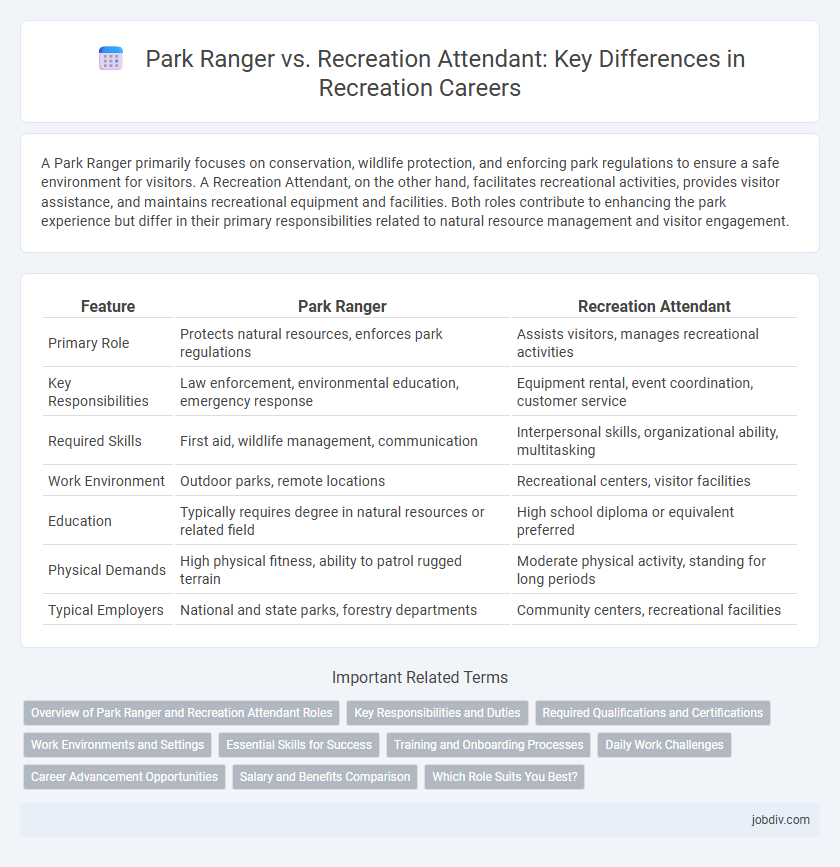A Park Ranger primarily focuses on conservation, wildlife protection, and enforcing park regulations to ensure a safe environment for visitors. A Recreation Attendant, on the other hand, facilitates recreational activities, provides visitor assistance, and maintains recreational equipment and facilities. Both roles contribute to enhancing the park experience but differ in their primary responsibilities related to natural resource management and visitor engagement.
Table of Comparison
| Feature | Park Ranger | Recreation Attendant |
|---|---|---|
| Primary Role | Protects natural resources, enforces park regulations | Assists visitors, manages recreational activities |
| Key Responsibilities | Law enforcement, environmental education, emergency response | Equipment rental, event coordination, customer service |
| Required Skills | First aid, wildlife management, communication | Interpersonal skills, organizational ability, multitasking |
| Work Environment | Outdoor parks, remote locations | Recreational centers, visitor facilities |
| Education | Typically requires degree in natural resources or related field | High school diploma or equivalent preferred |
| Physical Demands | High physical fitness, ability to patrol rugged terrain | Moderate physical activity, standing for long periods |
| Typical Employers | National and state parks, forestry departments | Community centers, recreational facilities |
Overview of Park Ranger and Recreation Attendant Roles
Park Rangers are responsible for protecting natural resources, enforcing park regulations, and providing educational programs to visitors, combining law enforcement duties with environmental stewardship. Recreation Attendants focus on facilitating recreational activities, maintaining facilities, and assisting visitors to ensure a safe and enjoyable experience within parks and recreational areas. Both roles support park operations but differ significantly in their emphasis on resource management versus visitor services.
Key Responsibilities and Duties
Park Rangers enforce park regulations, ensure visitor safety, conduct guided tours, and manage natural resource conservation efforts. Recreation Attendants facilitate recreational activities, maintain facilities, provide customer service, and assist in program coordination for community events. Both roles require strong communication skills, but Park Rangers emphasize law enforcement and environmental protection, while Recreation Attendants focus on activity management and visitor engagement.
Required Qualifications and Certifications
Park Rangers typically require a minimum of a bachelor's degree in fields such as natural resource management, environmental science, or forestry, along with certifications in first aid, CPR, and sometimes law enforcement training or firearm certification depending on jurisdiction. Recreation Attendants usually need a high school diploma or equivalent, with certifications often limited to CPR and first aid to ensure visitor safety during recreational activities. Both roles benefit from strong communication skills and physical fitness, but Park Rangers face more rigorous requirements due to their responsibilities in resource protection and law enforcement.
Work Environments and Settings
Park Rangers primarily work in national parks, forests, and wilderness areas, often exposed to outdoor conditions and responsible for law enforcement, resource protection, and visitor education. Recreation Attendants typically operate in recreational facilities such as community centers, pools, and playgrounds, providing program assistance and ensuring safety in more controlled, indoor or managed outdoor environments. The contrasting settings reflect the Ranger's emphasis on conservation and fieldwork versus the Attendant's focus on organized recreational activities and facility maintenance.
Essential Skills for Success
Park Rangers require essential skills such as wildlife management, emergency response, and environmental education to ensure park safety and conservation. Recreation Attendants excel in customer service, event coordination, and facility maintenance, focusing on enhancing visitor experience through organized activities. Strong communication, problem-solving, and teamwork are crucial for both roles to effectively support park operations and recreational programs.
Training and Onboarding Processes
Park Rangers undergo extensive training programs that include wildfire management, law enforcement, and emergency response, ensuring comprehensive preparedness for safeguarding natural resources. Recreation Attendants typically receive focused onboarding that emphasizes customer service, facility maintenance, and event coordination to enhance visitor experiences. Both roles require ongoing training, but Park Rangers engage in more rigorous certification processes to fulfill environmental protection and safety responsibilities.
Daily Work Challenges
Park Rangers face daily work challenges that include managing public safety, enforcing park regulations, and handling wildlife encounters in diverse environmental conditions. Recreation Attendants often deal with visitor coordination, facility maintenance, and ensuring compliance with recreational guidelines, which require strong communication and organizational skills. Both roles demand adaptability and problem-solving to address fluctuating visitor numbers and unexpected incidents in outdoor settings.
Career Advancement Opportunities
Park Rangers typically have more extensive career advancement opportunities due to their specialized training in law enforcement, natural resource management, and emergency response, enabling promotions to supervisory or management roles within park services. Recreation Attendants usually have entry-level positions focused on visitor services and maintenance, with limited pathways to higher-level roles unless they acquire additional education or certifications. Both careers benefit from experience and professional development, but Park Rangers generally access a broader range of advancement options and leadership positions.
Salary and Benefits Comparison
Park Rangers typically earn higher salaries than Recreation Attendants, with median annual wages around $46,000 compared to $29,000 for Recreation Attendants, reflecting the specialized training and law enforcement responsibilities of rangers. Park Rangers often receive comprehensive benefits including health insurance, retirement plans, and paid leave, which are generally more extensive than the benefits packages offered to Recreation Attendants. The salary and benefits disparity highlights the distinct roles and skill requirements, with Rangers focusing on resource protection and public safety, while Attendants concentrate on customer service and facility maintenance.
Which Role Suits You Best?
Park Rangers oversee natural parks, enforcing safety regulations, conducting educational tours, and protecting wildlife, ideal for those passionate about conservation and law enforcement. Recreation Attendants manage recreational facilities, organize activities, and assist guests, fitting individuals who enjoy customer service and event coordination. Choosing between these roles depends on whether you prefer outdoor environmental stewardship or engaging directly with visitors in leisure settings.
Park Ranger vs Recreation Attendant Infographic

 jobdiv.com
jobdiv.com